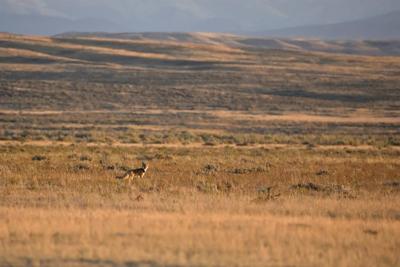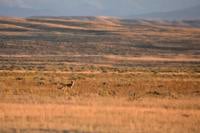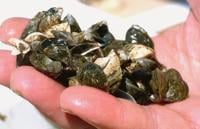FORT BELKNAP AGENCY, Mont. (AP) — Native species such as swift foxes and black-footed ferrets disappeared from the Fort Belknap Indian Reservation generations ago, wiped out by poisoning campaigns, disease and farm plows that turned open prairie where nomadic tribes once roamed into cropland and cattle pastures.
Now with guidance from elders and outside wildlife groups, students and interns from the tribal college are helping reintroduce the small predators to the northern Montana reservation sprawling across more than 1,000 square miles (2,600 square kilometers) near the U.S.-Canada border.
Sakura Main, a 24-year-old Aaniiih woman who is entering Fort Belknap's Aaniiih Nakoda College in January, is helping to locate, trap and vaccinate the against deadly plague in a program overseen by the tribal fish and game department.
The nocturnal animals live among the mounded burrows of prairie dog colonies, where ferrets stalk the rodents almost as big as they are, wrapping themselves around their prey to strangle and kill it.
On a recent clear night, the Nakoda sacred site Snake Butte looming on the horizon, Main shined a flashlight into a long, skinny, wire trap atop a prairie dog burrow. Inside was the second ferret that she'd caught that night with fellow wildlife worker C.J. Werk, daughter of the former tribal president.
“We got one in there!" Main quietly exclaimed.
“Wow, really another one?" replied Werk, who was engaged in a friendly competition with another worker, her cousin, to catch the most ferrets. “I'm going to rub it in.”
Hurried back to the “hospital trailer,” the animal was sedated and vaccinated against sylvatic plague carried by their favorite prey, work done in partnership with World Wildlife Fund. It had a microchip inserted beneath its skin for future tracking, before being released back into the prairie dog colony to a soft cheer from Main and Werk.
As extinctions of animals and plants accelerate around the globe, Native American tribes with limited funding are trying to re-establish imperiled species and restore their habitat — measures that parallel growing calls to “rewild” places by reviving degraded natural systems.
But the that Native Americans perceive differentiates their approach from western conservationists, who often emphasize “management” of habitat and wildlife that humans have dominion over, said Julie Thorstenson, executive director of the Native American Fish & Wildlife Society.
“Western science looks at humans as kind of external managers of the land and of the ecosystem,” she said. “Indigenous people see themselves as part of it.”
The Nakoda and Aaniiih people have struggled to restore their land to a wilder state. Plague periodically wipes out ferret populations, and half the foxes released so far may have died or fled.
But tribal members say they’re committed to rebuilding native species with deep cultural significance to restore balance between humans and the natural world. Tribal elders speak nostalgically of the long-gone Swift Fox Society, which prized the secretive, rarely seen animals and used their pelts and tails to adorn hair braids and costumes. They call the foxes and ferrets their “relatives.”
“It’s like having your family back,” said Mike Fox, former director of the Fort Belknap wildlife program. “We have a pretty darn good spot on the Northern Plains to bring these animals back and just about complete the circle of animals that were originally here.”
Prior to European settlement as many as one million ferrets occupied an estimated 156,000 square miles (400,000 square kilometers) from Canada to Mexico — wherever prairie dogs were found. By the 1960s, conversion of grasslands to crops, plague and poisoning campaigns reduced prairie dogs to 2,200 square miles (5,700 square kilometers). Ferrets were presumed extinct then rediscovered in 1981 on a ranch in Meeteetse, Wyoming.
They're one of the most endangered mammals in North America, with only about 300 in the wild, including fewer than 40 on Fort Belknap. Populations are propped up with a captive breeding program to counter periodic decimations by plague.
Prairie dogs are still considered a nuisance among ranchers, including on Fort Belknap, because they eat grass. Prairie dog shooting tournaments once were held annually to raise money for the tribal fish and game department, Fox said. The tournaments are gone on Fort Belknap, and prairie dogs — squirrel-sized rodents common across the U.S. Plains — are now recognized as vital to ferrets.
Parts of Fort Belknap also are being repopulated with bison, a species that sustained Native Americans for centuries before white settlers killed them off. Bison are being restored by dozens of tribes across the U.S., which is similar to efforts in the Pacific Northwest to sustain wild salmon populations, another keystone species that provides food for tribes.
The work to reestablish black-footed ferrets and swift foxes is different. Unlike bison and salmon, foxes and ferrets aren't food sources. They live in the shadows, hunting mostly at night, and are rarely seen.
Ferrets have been reintroduced to seven reservations on the Northern Plains and two tribal sites in the Southwest, while swift foxes have been returned to four reservations, said Shaun Grassel, a former biologist for the Lower Brule Sioux Tribe in South Dakota.
Less than 100 yards (91 meters) from a small pen holding three swift foxes about to be released at Fort Belknap, tribal elders Buster Moore and John Allen sat among cactuses and scrubby grasses and passed a pipe around a circle of men, while women sat nearby, watching and listening.
After the ceremony, Moore — whose Nakoda name is Buffalo Bull Horn — rubbed his hands on the hard earth, explaining that they prayed for the foxes, the tribes, the land itself.
“It sustains itself, it helps Mother Earth, everything sustain balance,” Moore said of the restoration work celebrated that day. “Prairie dogs, wolves, swift fox, red fox, black-footed ferrets.”
Once abundant on the plains, swift foxes now occupy about 40% of their original habitat. Since 2020, the tribes and college have worked with scientists from the Smithsonian’s ��ɫtv Zoo to capture about 100 foxes from healthy populations in Wyoming and Colorado and relocate them to Fort Belknap.
As Moore spoke, the reservation's fish and wildlife biologist Tim Vosburgh and two assistants cautiously approached a few foxes in a pen. They used wire cutters to cut through the chain link and pulled it open.
When they moved about 50 yards (46 meters) away, a fox poked its head out of a prairie dog burrow inside the pen. It soon darted out the opening, followed within minutes by two others.
They disappeared across the rolling landscape and into the glaring sun behind the Bearpaw Mountains to the west.
“What they need is a little luck,” said Allen the elder. "They need to survive the winter and then they won't have to worry about it, you know, because they've got all the skills. So we call on our relatives to protect them."
___
Follow Matthew Brown on Twitter:
___
Associated Press climate and environmental coverage receives support from several private foundations. See more about AP’s climate initiative . The AP is solely responsible for all content.
___
This story has been corrected to say that swift foxes were captured in Wyoming and Colorado, not Wyoming and Montana.















































